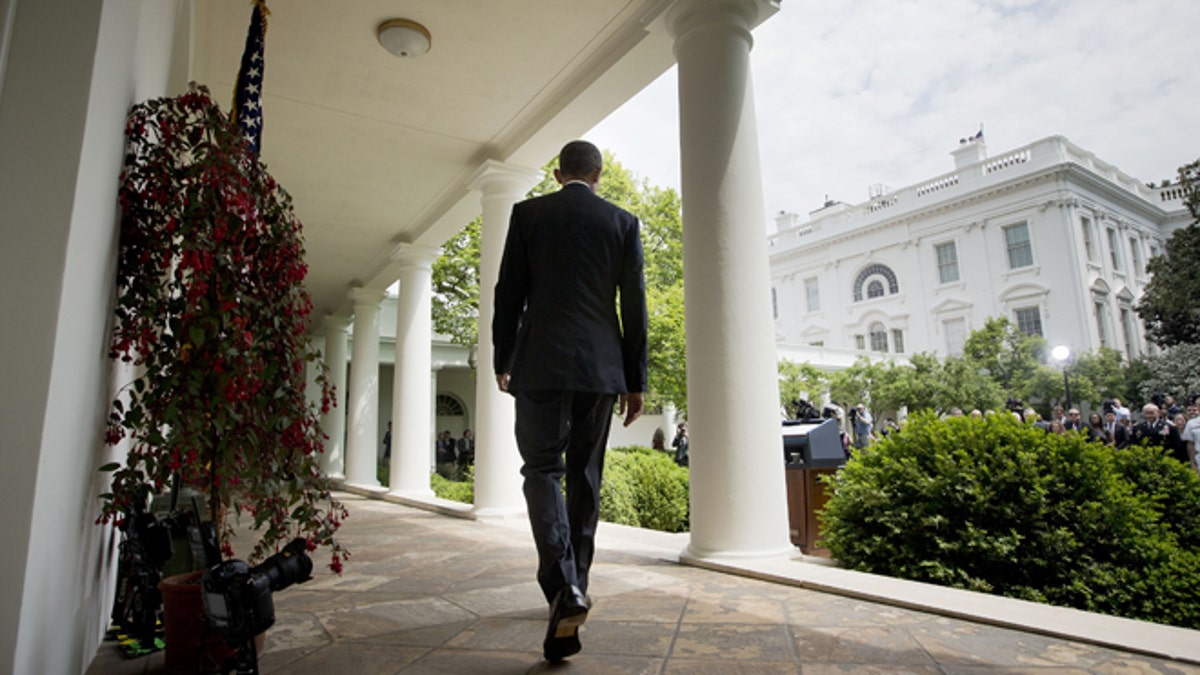
May 5, 2015: President Obama walks to the Rose Garden of the White House in Washington. (AP Photo/Pablo Martinez Monsivais)
When the Tea Party began in 2009, even those of us at the heart of the movement couldn’t have predicted how it would permanently alter America’s political landscape. Just six years later, it’s undeniably at the heart of American politics in spite of countless attacks from the political establishment and from the national media. Because of the Tea Party’s strength and influence, candidates who call themselves conservative must prove their bona fides to successfully court any grassroots support at all.
Because of the Tea Party’s strength and influence, candidates who call themselves conservative must prove their bona fides to successfully court any grassroots support at all.
Sen. Ted Cruz is a great example. Clearly a Tea Party favorite, Cruz has stood strong in the Senate for the movement’s values. He took the heat when others wouldn’t when it came to defunding ObamaCare and holding the congressional GOP leadership accountable for repeatedly caving to President Obama.
Because of the Tea Party’s strength and influence, candidates who call themselves conservative must prove their bona fides to successfully court any grassroots support at all.
Cruz is often criticized for his Tea Party boldness but that’s precisely what makes him attractive. The movement views him as a smart, principled, constitutionally grounded conservative.
CRUZ’S CHALLENGE: Using his well-honed firebrand conservatism to get broad support across the movement and bring other constituencies in the party along with him.
Gov. Mike Huckabee, who announced his candidacy on Tuesday, has a strong constituency in the evangelical segment of the Tea Party movement. A stalwart and unbending social conservative, those who look for that as the primary hallmark in a candidate will not doubt be attracted to him. And he's built is loyal following through his years with a Fox News weekend show. But Sen. Cruz took a straight shot at that base when he announced his candidacy at Liberty University last month. Ben Carson is also wearing his faith boldly on his sleeve. And Rick Santorum may yet end up in the race. So is Huckabee's base going to be split among the candidates? Hard to say right now.
HUCKABEE'S CHALLENGE: Huckabee is certainly a serious contender who knows how to run for president. If that experience counts, he's got a leg up on those currently declared. However, the most important question is whether Huckabee can sell himself as the candidate of the future amidst a field of so many young, dynamic candidates. That remains to be seen.
Rand Paul has a core base of support among libertarians in the Tea Party. His shifting positions on defense may be a problem as he tries to placate both a libertarian isolationist base and more hawkish conservatives.
He resonates with many in our movement because he honestly wants to rein in government spending, pay off the national debt which hinders economic growth, and scale back the ubiquitous growth of government.
PAUL’S CHALLENGE: Finding a comfort level with conservatives who like his independent streak but are leery of his positions being too close to his father’s.
Gov. Scott Walker, though not specifically from the movement nor explicitly catering to it, is nonetheless a front-runner for many Tea Party supporters because of his willingness to say what he’s going to do and his tenacity in the follow-through. He has repeatedly taken on the public employee unions in Wisconsin and emerged victorious.
Walker has been tried and tested in the crucible of the chief executive’s office, a clear contrast with senators already in the race. He’s a proven, consistent winner – no small characteristic for a Republican Party that hasn’t won the White House since 2004.
WALKER’S CHALLENGE: Maintaining his “rock star” status throughout a long and difficult primary and proving himself better researched and better versed especially on international issues. It’s about more than Wisconsin.
Sen. Marco Rubio also has a history of popularity with the Tea Party which was damaged by his leadership on an amnesty-disguised-as-immigration bill. Still, he’s got Tea Party game.
Even as a fresh face, he has already proven to be well researched and well versed on foreign policy. His mix of idealism, optimism and populism – based on his unique background – resonates deeply with Tea Partiers.
RUBIO’S CHALLENGE: Effectively reassuring the movement he learned from his mistake on immigration so that he can play to his strengths.
In contrast to these attractive candidates and potential candidates, former Florida Gov. Jeb Bush has zero support from a Tea Party movement that loathes him. Not only does he oppose the grassroots on crucial issues such as amnesty and Common Core, he exacerbates the rift by lecturing conservatives and rank-and-file Republicans; telling them he wants to have an “adult conversation” about these issues. We’ve already had 8 years of condescension from the current president.
Other candidates have given healthy nods toward the Tea Party even if they’re not products of it. Ben Carson and Carly Fiorina tout their professional success achieved without any help from Washington. Chris Christie’s willingness to publicly confront his state’s deficits and debt, along with standing up to the teachers union, pushes some favorable buttons in the Tea Party movement.
America’s political landscape has been forever changed, and it’s a testament to the health and vibrancy of our democracy. The Washington establishment can bristle, smirk and even curse all they want, but a Tea Party president is now a very real possibility.








































